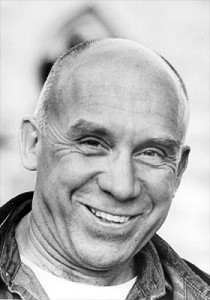 Hear with favor our prayers, which we humbly offer, O Lord, for the salvation of the soul of Father Louis (Thomas Merton), your servant and Priest, that he, who devoted a faithful ministry to your name, may rejoice in the perpetual company of your Saints.
Hear with favor our prayers, which we humbly offer, O Lord, for the salvation of the soul of Father Louis (Thomas Merton), your servant and Priest, that he, who devoted a faithful ministry to your name, may rejoice in the perpetual company of your Saints.
The famous Trappist monk, Thomas Merton (b. 1915) died on this date in 1968.
In very many ways Merton was a consummate human being: loved pleasure and engaged his freedom only to transform pleasure and his version of freedom with his embrace a life of prayer and silence as a Strict Observance Cistercian (a Trappist monk) in a Kentucky abbey. In the monastery Thomas Merton was known as Father M. Louis, a name I still prefer to use because of his commitment to the monastic life. At the command of his abbot, Merton wrote of his conversion in his 1949 best seller, The Seven Storey Mountain, introducing millions of people to the monastic life. No other book since this one has had such a critical impact on Catholics. His conversion story was only one of many books and essays published by Merton and even in death Merton continues to publish due to the finding of new materials or the repackaging of thought into new books. The irony of Merton’s life as a monk is that he died in Asia conferencing with an international and interfaith group of monks and nuns. His body was brought home in a steel casket on a military transport.
In his lifetime Merton was a voice of reason, a voice of sanity, a voice speaking the Word of God. As typical of public thinkers he became a voice and an influence for a variety of types of people, from artists, intellectuals, religious types, peace and nonviolence promoters and the like.
Key for me and dare I say for Benedictines of all stripes, Merton argued for a contemplative life which engages the reality of the world so that the monk, nun, oblate could intercede on behalf of the world for others (read The Sign of Jonas). Father Louis helps me to understand the Benedictine charism better when he says,
The Benedictine life is simply living the Gospel without fanfare…. The mainspring of everything in Saint Benedict is the love of Christ in Himself, in the poor, in the monastic community, in the individual brethren…. This is the key to the monastic life and spirit.
A life totally cut of is good for a few, like the Carthusians, but for Benedictines and the Cistercians (a reformed group of Benedictines) who form a school of prayer and love in Christ, nothing is out-of-bounds. Merton, indeed, opened the doors to a new manner of living the vitally important monastic life today.
He sought to be a saint, that is, be yourself, is the vocation that all of us ought to consider doing with seriousness. The Pope echoes this notion, so does Communion and Liberation. Great minds think alike.
Watch Father Jim Martin’s video presentation on Thomas Merton.
Thomas Merton’s work continues with the initiative of The Merton Institute for Contemplative Living.